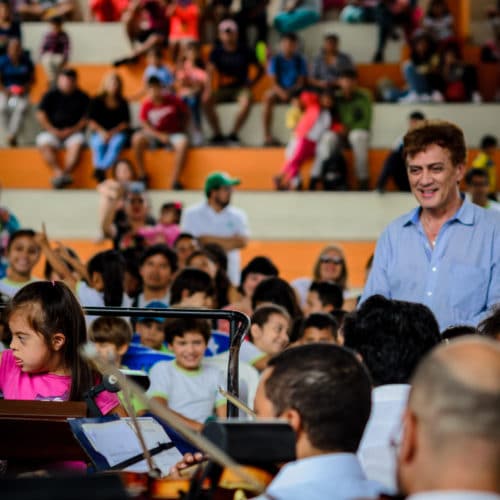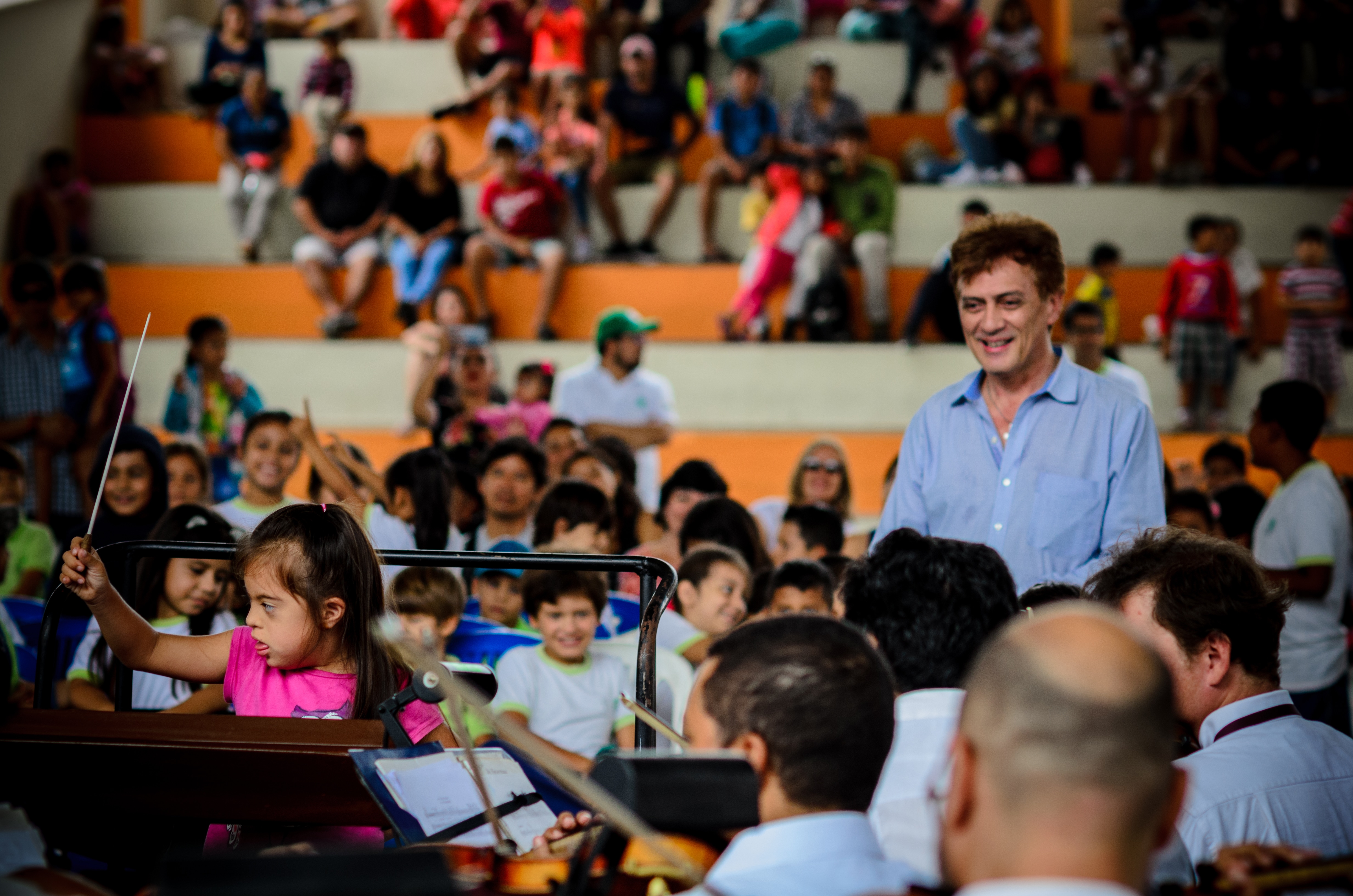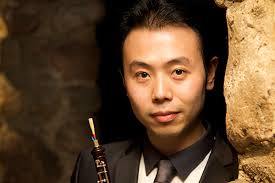There’s an orchestra in the Galapagos
mainThe conductor Dante Santiago Anzolini has been telling us about his Orquesta Sinfónica de Guayaquil, which does not just make music. It also tries to save the planet.
The Festival “Music for the Planet” this weekend was created be me with the intention of relating the experience of playing, learning, listen to symphonic music with promoting ecological awareness in view of the evident immediate perils of global warming coupled with environmental destruction.
The first edition took place in June 2018: The Orquesta Sinfónica de Guayaquil played four concerts under my guidance: one for children, one for the teenagers, and finally one for the whole family. The repertoire ranged from Beethoven to Mahler, Ravel, Richard Strauss, ending with some orchestral arrangements of popular music, rap, folk and pop, all from composers living in the islands, with lyrics underlining the blessings of ecological paradise.
All pieces were introduced to the public for the first time in history, since no orchestra of this size had ever set foot in Galápagos, nor the concerts presented in the past had the success and attendance shown with us.
The closing ceremony was presented with Copland’s Fanfare for the Common Man, followed by the South American premiere of the film “Jane”, a biopic of Jane Goodall, made of the original footage of her own experiences in Africa with Chimps and different types of primates. The music was composed by Philip Glass, the OSG accompanied the film with live music.
My interest in creating this could be summarized into the following ideas:
– Music performance, its preparation and studying, needs self awareness, inner motivation, intelectual skills, muscular control and analytical skills. Its practice also provides knowledge of other Arts.
-Music education is presented as one particular tool for a needed self-awareness. To understand oneself is to begin understanding the world. Translated into introspection and self-analysis, the acquaintance of artístic knowledge may help constructing a more accurate observation of the world, thus, it will inspire conscientiousness about environmental protection.
-The current events show a particularly evidence on accumulative data for global perils.
This year, the environmental protection theme is “” PLASTIC “”, the need to restrain its use, the known consequences of its abuse, the current contamination of the sea.
For this purpose this year of 2019 we organized 4 events:
1- On Friday 23rd some small groups from the orquesta will visit elementary and High schools and of Santa Cruz, Galapagos with the intention of showing and demonstrating how to “use” music, its study, practicing, objectives, how to understand the benefit it provides, the possibliity of social change by creating musical ensembles, and the intellectual growth as a consequence of its analytical study.
2 – First Concert: for young people at the San Francisco School. The repertoire thematically encompasses Shakespeare, the genre opera, orchestral music as an important element use in the film industry, the arrangements of popular music.
3-Second Concert for everyone, outdoors. The repertoire contains Mars and Jupiter by Gustav Holst, Ecuadorian national music, my orchestral arrangements for accompanying singers from Galapagos, and from the continent, some pop contemporary popular music played by the Orchestra.
4 -Third Concert for all audience at the San Francisco School. The ***Verdi La Forza-Dvorak New World-Holst The Planets*** concert program is conceived as the orchestral main course, with paradigmatic pieces, all of great popularity among interested public, all of them created visible consequences in the film industry, all of them possesing immanent significance on the search for individual awaraness.
Each one of the pieces will be described in its historic background, circumstances of its creation, and relationship with self-awareness. Short videos showing the current perils of plastic in the seas will be shown for the audience. The objective of dissemination our musical art is to promote individual musical practice to young audiences as a priority. The emergence and sustainability of orchestras and youth choirs promotes the integration of activities that generate joint and interdependent work discipline.
Finally, showing musical work as part of a multi-disciplinary whole -as it is being done in Guayaquil through my own Youth Symphony Orchestra, can function as a good experimentation in Galapagos: a relatively small young population in the Islands could be used to set a model for intensive work on orchestral music, but not only music : it must be accompanied by instruction in mathematics, history, geography, philosophy and psychology, to create a model for round education -a very old but nowadays new humanistic approach.







How did the orchestra get to the Galapagos? By plane or boat?
We arrived by plane in four different flights. The Orchestra’s crew, the operation’s manager and Human Resources Chief flew earlier -in order to secure the percussion and double bases transferring, and the hotel allocations.
Who gives thumbs down to the answer to a simple question? Why?
I assume because of the fact they flew.
I applaud the intention, but is putting a whole orchestra on a plane really the best way to contribute to saving the planet? If orchestras are going to take the climate crisis seriously, then surely the biggest contribution they could make would be precisely to reject plane travel and commit to thinking local.
Dear Anon.
I assume then that we should have cancelled the tour because the only Airline that is allowed to take us -we all employed by the State, taken by the State Airline- is not able to take us in one flight.
If three flights instead the desired one caused the known pollution you underline, then we would have needed to travel by a ship -but you do not know that there is NO ship that take people, the few ships that leave Guayaquil to Galápagos take cargo.
But let us imagine that we hire a Ship at a huge cost. Then:
Each travelling day would have provoked a non productive absence of musicians, who by law are supposed to receive extra-payment for each day of the tour.
Now, let us say that we cancel the Festival because of the pollution caused by the planes.
They counted around 4200 attendants in the three evenings, plus students of 9 (nine) schools counting about 3000 students. The great majority had never heard a concert, asides from the ones we played in 2018.
Since our reduced budget permitted allowed limited spending, I had to say yes to the planes.
I truly believe that we made a great Impact in the Community. So many people came to thank us for the “incredible” experience of listening an Orchestra alive.
yours,
DSA
Er…the point was not the number of flights (or whether you went by ship)…but the fact you went at all.
Still must be nice going to exotic locations while lecturing people about saving the planet. It is obviously something you believe other people should do.
A remarkable and praiseworthy enterprise, Mr. Anzolini. One can only imagine the difficulties you faced and overcame. Wouldn’t Charles Darwin be surprised? With every good wish to you and the Orquesta Sinfonica Guayaquil of Ecuador in all your activities.
thanks a lot for your nice words. Yes, the amount of difficulties found in this cultural operation were abundant. But we earned the appreciation of a new audience, in a place where Orchestra concerts do not exist. We will try to create a new culture which may cause benefits both in their population and also the tourists arriving to this remarkable place…
Thanks also for your wishes
Thank you, Mr. Anzolini. for explaining the logistic and practical realities you faced. There were surely many others.
Your audiences of 4,200 over three events, plus the 3,000 students, are a large part part of Galapagos Islands’ population of 35,000, not counting the odd finch or sea-turtle. It sounds like a triumph!
The chance to hear an orchestra and its music for the first time could be life-changing for some in your audiences. Music changes lives.